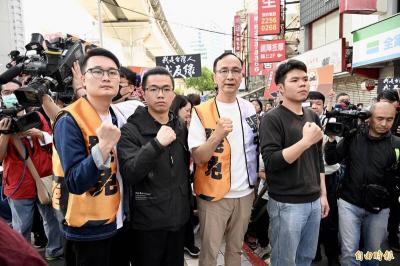Lawmakers from the three major parties formed an alliance yesterday to push for an early start of the long-talked-about reform of the Legislative Yuan.
The DPP's Chen Chin-teh (
The lawmakers said many candidates had listed "promoting downsizing of the legislature and putting an end to legislative chaos" as their major campaign promises during last December's elections.
Relations between the ruling and opposition camps have remained tense since the inauguration of the new legislature in February and discussions on reforms have been futile so far.
The lawmakers said they are worried that legislative reforms will still be a pipe dream when their terms end in three years.
Since cutting the number of seats is the least contentious reform proposal, Chen said the new alliance would first focus on forging an inter-party consensus on the issue.
The Constitution stipulates that the legislature should have 225 members. Any change to the number of seats would require constitutional amendments which need the support of all major political parties.
"Given the complex and onerous process of amending the Constitution, ruling and opposition parties should sit down to patiently discuss how to design a more reasonable size, framework or structure for our new legislature," Chen said.
As to how the new legislators would be elected and how constituencies would be readjusted, Chen said those details can be prescribed in a law instead of being put into the Constitution.
Tsai echoed Chen's view, saying that most countries in the world only stipulate the number of parliamentary seats in their constitutions and set out parliamentary electoral systems in separate laws.
Noting that the main purpose of the reforms is not just to scale down the legislature, Tsai said all major parties should rationally and extensively discuss adjusting the number of seats to a reasonable level in order to ensure smooth and efficient operations in the lawmaking body.
The Government Reform Committee unveiled a legislative reform blueprint on Sunday. According to the plan, the number of seats should be cut to from 225 to 150. It also recommends a "single-member district, two vote" system for legislative elections and an extension of the terms of legislators from three to four years.
The plan has drawn criticism from the opposition parties. Even many DPP legislators have said that they disagree with certain aspects of the plan. The DPP legislative caucus and the party headquarters are still integrating their own versions of the reform plan.
The KMT and the PFP legislative caucuses are also drafting their own reform proposals.

The Ministry of Economic Affairs has fined Taobao NT$1.2 million (US$36,900) for advertisements that exceeded its approved business scope and ordered the Chinese e-commerce platform to make corrections in the first half of this year or its license would be revoked. Lawmakers have called for stricter supervision of Chinese e-commerce platforms and more stringent measures to prevent China from laundering its goods through Taiwan as US President Donald Trump’s administration cracks down on origin laundering. The legislature’s Finance Committee yesterday met to discuss policies to prevent China from dumping goods in Taiwan, inviting government agencies to report on the matter. Democratic Progressive Party

Taiwan and its Pacific ally Tuvalu on Tuesday signed two accords aimed at facilitating bilateral cooperation on labor affairs, according to Taiwan’s Ministry of Foreign Affairs (MOFA). The governments inked two agreements in Taipei, witnessed by Foreign Minister Lin Chia-lung (林佳龍) and visiting Deputy Tuvaluan Prime Minister Panapasi Nelesone, MOFA said in a news release. According to MOFA, the agreements will facilitate cooperation on labor issues and allow the two sides to mutually recognize seafarers’ certificates and related training. Taiwan would also continue to collaborate with Tuvalu across various fields to promote economic prosperity as well as the well-being of their

The Taipei District Prosecutors’ Office has continued its investigation into allegations of forged signatures in recall efforts today by searching the Chinese Nationalist Party’s (KMT) city chapter and questioning several personnel including the chapter director, according to media reports. Among those questioned and detained were KMT Taipei chapter director Huang Lu Chin-ju (黃呂錦茹), chapter secretary-general Chu Wen-ching (初文卿), chapter secretary Yao Fu-wen (姚富文) and first district committee executive director Tseng Fan-chuan (曾繁川). Prosecutors said they would not confirm reports about who had been summoned. The investigation centers on allegations that the ongoing recall campaigns targeting Democratic Progressive Party legislators Rosalia Wu (吳思瑤)

Several Chinese Nationalist Party (KMT) officials including Chairman Eric Chu (朱立倫) are to be summoned for questioning and then transferred to prosecutors for holding an illegal assembly in Taipei last night, the Taipei Police said today. Chu and two others hosted an illegal assembly and are to be requested to explain their actions, the Taipei City Police Department's Zhongzheng (中正) First Precinct said, referring to a protest held after Huang Lu Chin-ju (黃呂錦茹), KMT Taipei's chapter director, and several other KMT staffers were questioned for alleged signature forgery in recall petitions against Democratic Progressive Party (DPP) legislators. Taipei prosecutors had filed